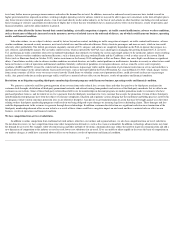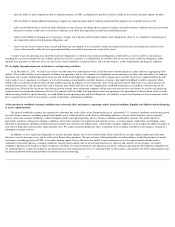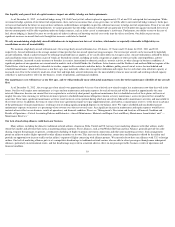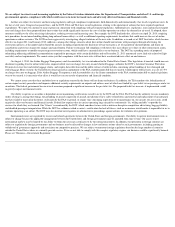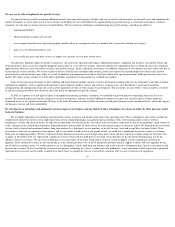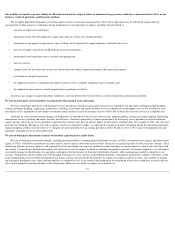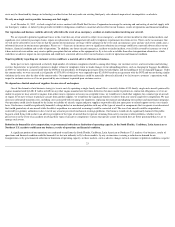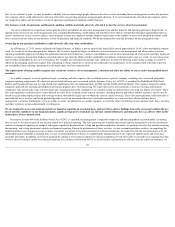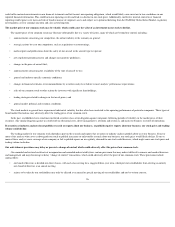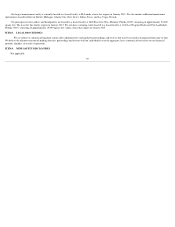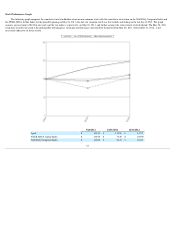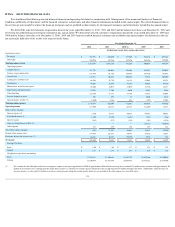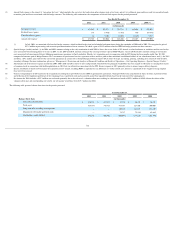Spirit Airlines 2012 Annual Report Download - page 26
Download and view the complete annual report
Please find page 26 of the 2012 Spirit Airlines annual report below. You can navigate through the pages in the report by either clicking on the pages listed below, or by using the keyword search tool below to find specific information within the annual report.
low. As we continue to grow, we may be unable to identify, hire or retain enough people who meet the above criteria, including those in management or other key positions.
Our company culture could otherwise be adversely affected by our growing operations and geographic diversity. If we fail to maintain the strength of our company culture,
our competitive ability and our business, results of operations and financial condition could be harmed.
Our business, results of operations and financial condition could be materially adversely affected if we lose the services of our key personnel.
Our success depends to a significant extent upon the efforts and abilities of our senior management team and key financial and operating personnel. In particular, we
depend on the services of our senior management team, including Ben Baldanza, our President and Chief Executive Officer. Competition for highly qualified personnel is
intense, and the loss of any executive officer, senior manager or other key employee without adequate replacement or the inability to attract new qualified personnel could
have a material adverse effect on our business, results of operations and financial condition. We do not maintain key-man life insurance on our management team.
Ownership by our principal stockholders could adversely affect our other stockholders.
As of February 11, 2013, entities affiliated with Indigo Partners, or Indigo, a private equity firm, beneficially owned approximately 16.6% of our outstanding common
stock. As a result of its ownership positions, Indigo is able to exert a significant degree of influence or actual control over our management and affairs and over matters
requiring stockholder approval, including the nomination and election of directors, a merger, consolidation or sale of all or substantially all of our assets and other significant
business or corporate transactions. Indigo's ownership interest may limit the ability of other stockholders to influence corporate matters and, as a result, we may take actions
that our other stockholders do not view as beneficial. For example, this substantial ownership stake could have the effect of delaying or preventing a change in control or
otherwise discouraging a potential acquirer from attempting to obtain control of us, which in turn could cause the market price of our common stock to decline or prevent
our stockholders from realizing a premium over the market price for their common stock.
The requirements of being a public company may strain our resources, divert management’s attention and affect our ability to attract and retain qualified board
members.
As a public company, we incur significant legal, accounting and other expenses that we did not incur as a private company, including costs associated with public
company reporting requirements. We also have incurred and will incur costs associated with the Sarbanes-Oxley Act of 2002, as amended, the Dodd-Frank Wall Street
Reform and Consumer Protection Act and related rules implemented or to be implemented by the SEC and the NASDAQ Stock Market. The expenses incurred by public
companies generally for reporting and corporate governance purposes have been increasing. We expect these rules and regulations to increase our legal and financial
compliance costs and to make some activities more time-consuming and costly, although we are currently unable to estimate these costs with any degree of certainty. These
laws and regulations could also make it more difficult or costly for us to obtain certain types of insurance, including director and officer liability insurance, and we may be
forced to accept reduced policy limits and coverage or incur substantially higher costs to obtain the same or similar coverage. These laws and regulations could also make it
more difficult for us to attract and retain qualified persons to serve on our board of directors, our board committees or as our executive officers and may divert
management’
s attention. Furthermore, if we are unable to satisfy our obligations as a public company, we could be subject to delisting of our common stock, fines, sanctions
and other regulatory action and potentially civil litigation.
We are required to assess our internal control over financial reporting on an annual basis, and any future adverse findings from such assessment could result in a
loss of investor confidence in our financial reports, significant expenses to remediate any internal control deficiencies and ultimately have an adverse effect on the
market price of our common stock.
Pursuant to Section 404 of the Sarbanes-Oxley Act of 2002, as amended, our management is required to report on, and our independent registered public accounting
firm to attest to, the effectiveness of our internal control over financial reporting. The rules governing the standards that must be met for management to assess our internal
control over financial reporting are complex and require significant documentation, testing and possible remediation. Annually, we perform activities that include reviewing,
documenting, and testing our internal control over financial reporting. During the performance of these activities, we may encounter problems or delays in completing the
implementation of any changes necessary to make a favorable assessment of our internal control over financial reporting. In connection with the attestation process by our
independent registered public accounting firm, we may encounter problems or delays in completing the implementation of any requested improvements and receiving a
favorable attestation. In addition, if we fail to maintain the adequacy of our internal control over financial reporting we will not be able to conclude on an ongoing basis that
we have effective internal control over financial reporting in accordance with Section 404. If we fail to achieve and maintain an effective internal control environment, we
25


